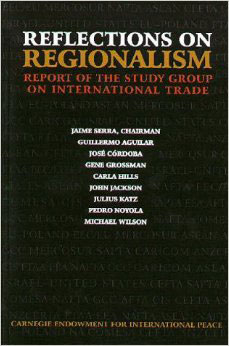Source: Washington, DC: Carnegie Endowment for International Peace, 1997
Summary
Over the last three decades, regional trade agreements (RTAs) have proliferated to the point where, by 1995, virtually all members of the newly formed World Trade Organization (WTO) were members of an RTA of some kind—whether a customs union, a free-trade agreement, or an interim agreement leading to one or the other.
Analysts are divided about the effects of RTAs. Some believe that taking further steps in the direction of trade and investment liberalization—even when restricted to a particular region—contributes to creation of world trade and investment. Others believe that the implicit discrimination that these agreements embody diverts rather than creates worldwide trade and investment.
The Study Group—composed of eminent former trade negotiators and experts—gives its assessment of the thrust of existing theoretical as well as empirical analyses of the effects of RTAs. It then offers the WTO a series of recommendations aimed at strengthening its leadership role in managing RTAs. The proposals focus on improving existing rules governing RTA formation as well as operation so as to minimize the risk of trade and investment diversion resulting from RTAs and to induce trade- and investment-creating behavioral patterns for existing and future RTAs.
Advance Praise
“Reflections on Regionalism points up a neglected issue in GATT/WTO negotiations. We need to be sure the strong interest in regional arrangements doesn't undermine the multilateral system, and the illustrious and experienced authors show how it should be done.”
—Paul A. Volcker
“This report focuses beautifully on the reasons why the proliferating free trade agreements now pose a danger to the world trading system and offers creative solutions to the problems they present.”
—Jagdish Bhagwati





